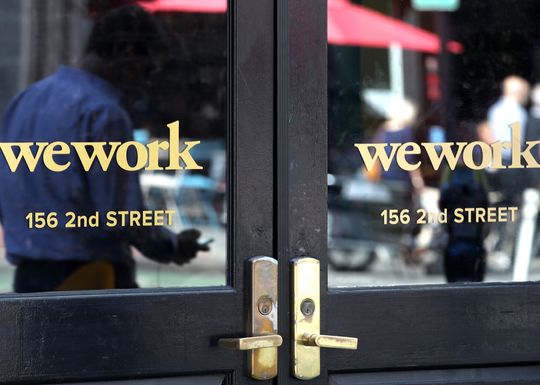‘We…. got it wrong,’ Mizuho analyst says, downgrading stock to neutral from buy
WeWork Inc.’s stock fell 14.6% to a record low on Wednesday, after the office-sharing company announced the imminent departure of its chief executive, garnering a downgrade from Mizuho.
The stock WE, -24.71% was last quoted at 30 cents. On its first day of trading after going public via a merger with a special-purpose acquisition vehicle, or SPAC, on Oct. 21, 2021, it closed at $11.78.
Mizuho analyst Vikram Malhotra cut his rating to neutral from buy and slashed his price target to 30 cents from $1.75.
“We … got it wrong,” the analyst wrote in his note to clients.
WeWork said Sandeep Mathrani, CEO since February of 2020, is stepping down effective May 26. It named David Tolley, a board member, as interim CEO while it conducts a search for a permanent one.
“The abruptness of the decision/announcement leads us to believe this change may not be entirely voluntary,” the analyst wrote, adding that he expects the move to be “disruptive,” especially given current macro headwinds.
“We now see our base case business assumptions, specifically occupancy targets, as unachievable, leading to higher cash burn and eventually driving the need for outside capital. We do not see free cash flow [becoming] positive until year-end 2025.”
The news is the latest blow to WeWork, the infamous startup created by Israeli entrepreneur Adam Neumann, that at its peak was valued at $47 billion.
The company began life renting office space to gig-economy freelancers in Manhattan in 2010, before expanding rapidly to 425 locations in 27 countries using money raised from private investors, notably Japanese conglomerate SoftBank.
Neumann was ousted in 2019 after botching the company’s then planned IPO, wangling a billion-dollar package on his way out the door. The company and its founder’s colorful history was captured in the Apple TV series, “WeCrashed,” starring Oscar winner Jared Leto as Neumann, as well as in a Hulu documentary called “WeWork: or The Making and Breaking of a $47 Billion Unicorn.”
By the time it merged into SPAC BowX Acquistion Corp., its valuation had shrunk to $9 billion.
Under Mathrani’s leadership, the company has made substantial progress in right-sizing the cost structure and eliminating more than $2.3 billion of recurring costs, according to Mizuho’s Malhotra.
It has improved its occupancy rate to 75% from the low in the mid-40s seen during the COVID pandemic, and restructured its balance sheet to wipe out $1.2 billion in debt.
“We see the CEO change as disruptive in terms of strategy and likely employee turnover,” he wrote.
Still, Mizuho has some faith in the flexible model for the office space, under which it viewed WeWork as a quasi “call option” — assuming the office sector partially recovers.
“Our Bull Case incorporates the company being able to drive occupancy to over 80% the next 12 months and our Bear Case assumes corporate restructuring,” the analyst said.
In its most recent earnings, WeWork had narrowed its first-quarter net loss to $264 million, or 34 cents a share, from $435 million, or 57 cents a share, in the year-ago period. The FactSet consensus for per-share losses was 35 cents.
Revenue grew 11% to $849 million, compared with the FactSet consensus of $849.3 million.

